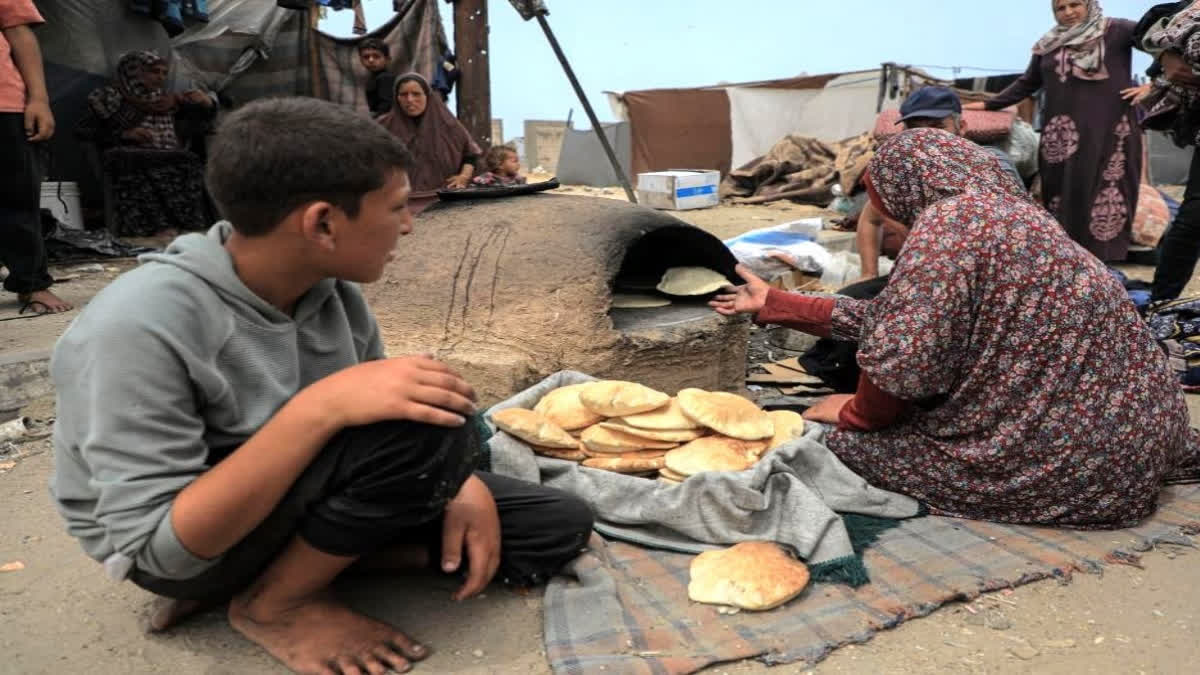Cairo: The United Nations suspended food distribution in the southern Gaza city of Rafah on Tuesday due to a lack of supplies and an untenable security situation caused by Israel's expanding military operation. It warned that humanitarian operations across the territory were nearing collapse.
Along with closed and chaotic land crossings, problems also plagued the US military's floating pier meant to provide an alternative route for aid into Gaza by sea. Over the weekend, hungry Palestinians took aid from a U.N. vehicle convoy coming from the pier, and the U.N. said since then it had been unable to receive trucks there.
Pentagon press secretary Major General Pat Ryder told reporters in Washington that for the past few days, forward movement of aid from the pier was paused but it resumed Tuesday. There was no confirmation from the U.N. The U.N. has not specified how many people stayed in Rafah since the Israeli military began its intensified ground and air campaign there two weeks ago, but apparently several hundred thousand Palestinians remain.
The U.N.'s World Food Program said it was also running out of food for central Gaza, where hundreds of thousands of people sought shelter in a chaotic exodus after fleeing Rafah, setting up new tent camps or crowding into areas already devastated by previous Israeli offensives Humanitarian operations in Gaza are near collapse, said Abeer Etefa, a WFP spokesperson. If food and other supplies don't resume entering Gaza in massive quantities, famine-like conditions will spread, she said.
The warning came as Israel seeks to contain the international fallout from a request at the world's top war crimes court for arrest warrants targeting both Israeli and Hamas leaders. The move garnered support from three European countries, including Israel's key ally France. The chief prosecutor at the International Criminal Court cited Israeli Prime Minister Benjamin Netanyahu and Defense Minister Yoav Gallant for alleged use of starvation as a method of warfare, a charge they and other Israeli officials angrily deny.
The prosecutor accused three Hamas leaders of war crimes over killings of civilians in the group's October 7 attack. The U.N says some 1.1 million people in Gaza nearly half the population face catastrophic levels of hunger and that the territory is on the brink of famine. The humanitarian crisis deepened after Israeli forces pushed into Rafah on May 6, vowing to root out Hamas fighters.
Tanks and troops seized the Rafah crossing into Egypt, closing it ever since. After May 10, only about three dozen trucks made it into Gaza via the nearby Kerem Shalom crossing from Israel because fighting makes it dangerous for aid workers to reach it, the U.N. says. Israel insists it puts no restriction on the number of trucks entering Gaza. COGAT, the Israeli military office in charge of coordinating aid, said 450 trucks entered Tuesday from its side to Kerem Shalom and a small crossing in northern Gaza. It said more than 650 trucks are waiting on the Gaza side of Kerem Shalom to be retrieved, blaming lack of logistical capabilities and manpower gaps among aid groups.
For months, the U.N. has warned that an Israeli assault on Rafah could wreck the effort to get food, medicine and other supplies to Palestinians across Gaza. Throughout the war, Rafah has been filled with scenes of hungry children holding out pots and plastic containers at makeshift soup kitchens, with many families reduced to eating only one meal a day. The city's population had swelled at one point to some 1.3 million people, most of whom fled fighting elsewhere.
Around 810,000 people have streamed out of Rafah, although Israel says its operations in Rafah are not the full-scale invasion of the city it had planned. The U.S. says Israel never presented credible plan for evacuating the population or keeping it safe. The main agency for Palestinian refugees, UNRWA, announced the suspension of distribution in Rafah in a post on X, without elaborating beyond citing the lack of supplies. U.N. spokesman Stephane Dujarric said the UNRWA distribution center and the WFP's warehouses in Rafah were "inaccessible due to ongoing military operations.
Asked about the ramifications of suspending aid, Dujarric said simply: People don't eat. Etefa said the WFP had also stopped distribution in Rafah after exhausting its stocks. It is still passing out hot meals and limited distributions of reduced food packages in central Gaza, but food parcel stocks will run out within days, she said.
The U.S. depicted the floating aid pier as a potential route for accelerated deliveries. The first 10 trucks rolled off a ship onto the pier on Friday and were taken to a WFP warehouse. But a second shipment of 11 trucks on Saturday was met by Palestinian crowds who took supplies, and only five trucks made it to the warehouse, Etefa said.
No further deliveries came from the pier on Sunday or Monday, she said. The responsibility of ensuring aid reaches those in need does not end at the crossings and other points of entry into Gaza it extends throughout Gaza itself, she said. At the same time, battles have escalated in northern Gaza as Israeli troops conduct operations against Hamas fighters, who the military says regrouped in areas already targeted in offensives months ago.
One of the main hospitals still operating in the north, Kamal Adwan, was forced to evacuate after it was targeted by Israeli troops, the Gaza Health Ministry said. Around 150 staff and dozens of patients fled the facility, including intensive care patients and infants in incubators under fire from shelling, it said. The Israeli military did not immediately reply to requests for comment.
Read more



